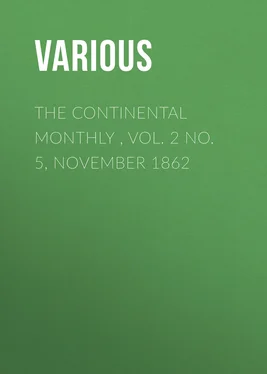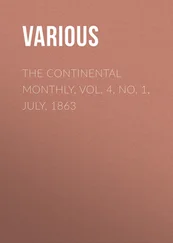Various - The Continental Monthly , Vol. 2 No. 5, November 1862
Здесь есть возможность читать онлайн «Various - The Continental Monthly , Vol. 2 No. 5, November 1862» — ознакомительный отрывок электронной книги совершенно бесплатно, а после прочтения отрывка купить полную версию. В некоторых случаях можно слушать аудио, скачать через торрент в формате fb2 и присутствует краткое содержание. Жанр: foreign_antique, periodic, Языкознание, Политика, foreign_edu, на английском языке. Описание произведения, (предисловие) а так же отзывы посетителей доступны на портале библиотеки ЛибКат.
- Название:The Continental Monthly , Vol. 2 No. 5, November 1862
- Автор:
- Жанр:
- Год:неизвестен
- ISBN:нет данных
- Рейтинг книги:3 / 5. Голосов: 1
-
Избранное:Добавить в избранное
- Отзывы:
-
Ваша оценка:
- 60
- 1
- 2
- 3
- 4
- 5
The Continental Monthly , Vol. 2 No. 5, November 1862: краткое содержание, описание и аннотация
Предлагаем к чтению аннотацию, описание, краткое содержание или предисловие (зависит от того, что написал сам автор книги «The Continental Monthly , Vol. 2 No. 5, November 1862»). Если вы не нашли необходимую информацию о книге — напишите в комментариях, мы постараемся отыскать её.
The Continental Monthly , Vol. 2 No. 5, November 1862 — читать онлайн ознакомительный отрывок
Ниже представлен текст книги, разбитый по страницам. Система сохранения места последней прочитанной страницы, позволяет с удобством читать онлайн бесплатно книгу «The Continental Monthly , Vol. 2 No. 5, November 1862», без необходимости каждый раз заново искать на чём Вы остановились. Поставьте закладку, и сможете в любой момент перейти на страницу, на которой закончили чтение.
Интервал:
Закладка:
It may be inferred that no man in the concern works harder than its owner, and we believe that this is acknowledged by all its employés. Day after day he wears the harness of silent and patient toil.
It is not generally known that during these hours of application, and while engrossed in the management of his immense operations, no one is allowed to address him personally until his errand or business shall have been first laid before a subordinate. If it is of such a character that that gentleman can attend to it, it goes no farther, and hence it vests with him to communicate it to his principal. To illustrate this circumstance, we relate the following incident: A few weeks ago a person entered the wholesale department, with an air of great importance, and demanded to see the proprietor. That proprietor could very easily be seen, as he was sitting in his office, but the stranger was courteously met by the assistant, with the usual inquiry as to the nature of his business. The stranger, who was a Government man, bristled up and exclaimed, indignantly, 'Sir, I come from Mr. Lincoln, and shall tell my business to no one but Mr. Stewart.' 'Sir,' replied the inevitable Mr. Brown, 'if Mr. Lincoln himself were to come here, he would not see Mr. Stewart until he should have first told me his business.'
The amount of annual sales made at this establishment is not known outside of the circle of managers, but may be variously estimated at from ten to thirty millions. This includes the retail department, whose daily trade varies, according to weather and season, from three thousand to twelve thousand dollars per day. To supply this vast demand for goods, Mr. Stewart has agencies in Paris, London, Manchester, Belfast, Lyons, and other European marts. Two of the above cities are the permanent residences of his partners; and while Mr. Fox represents the house in Manchester, Mr. Warton occupies the same position in Paris. These gentlemen are the only partners of the great house of A.T. Stewart & Co.
The marble block which the firm now occupies was built nearly twenty years ago. It had been the site of an old-fashioned hotel—which, like many others of its class, bore the name of 'Washington,' and which was eventually destroyed by fire. Mr. Stewart bought the plot at auction for less than $70,000, a sum which now would be considered beneath half its value. To this was subsequently added adjacent lots in Broadway, Reade and Chambers streets, and the present magnificent pile reared. To such of our readers as walk Broadway, we need not add any detail of its dimensions, nor mention what is now well known, that, large as it is, it is still too small for the increasing business. Hence another mercantile palace has been erected by Mr. Stewart in Broadway near Tenth street. This is intended for the retail trade, and is, no doubt, the most convenient, as well as the most splendid structure of the kind in the world. After the retail department shall have been thus removed up town the present store will be devoted to the wholesale trade.
If any of our readers should inquire what impulse moves the energies of one whose circumstances might warrant a life of ease, we presume that the reply would be force of character and the strength of habit. Mr. Stewart has an empire in the world of merchandise which he can neither be expected to resign or abdicate. We cannot regret that law of centralization which builds up one marble palace, where hundreds have failed utterly to make a living. Centralization of trade has its objections, and yet, upon the whole, there is, no doubt, a much healthier and happier condition prevailing among the parties connected with Mr. Stewart, than would be found among the struggling concerns (say fifty or more) whose place he has taken. Centralization is a law in trade whose movement crushes the weak by an inevitable step, while, by compelling them to take refuge beneath the protection of the strong it affords a better condition than the one from which they have been driven. To his early perception of this law Mr. Stewart largely owes his present colossal fortune.
UNHEEDED GROWTH
As on the top of Lebanon,
Slowly the Temple grew,
All unobserved, though every shaft
A giant shadow threw:
Unheeded, though the golden pomp
Of ponderous roof and spire,
Wrought in the chambers of the earth,
Like subterranean fire:
Until the huge translated pile,
By brother kings upreared,
On Zion's hill, enthroned at last,
In silence reappeared.
So, not with observation comes
God's kingdom in the heart;
But like that Temple, silently,
With golden doors apart.
And all the Mighty Ones that watch,
With folded wings above,
Trembling with awe, now stoop to earth,
On messages of love.
Another Temple riseth fast,
Unbuilt of mortal hands,
Upheaving to the battle-blast
Of Freedom's conquering bands!
The bannered host—the darkened skies—
The thunderings all about,
Foreshadow but a Nation's birth,
Answering a Nation's shout!
RED, YELLOW, AND BLUE
Alas for the old fashions! Wonder, incredulity, curiosity, and a crowd of primitive sensations, the whooping host that greeted, like misformed brutes on Circean shores, the steamboat and the telegraph, are passing away on a Lethean tide, and our mysteries are departing from among us. The intelligence which so long gazed wistfully upon the barred door of nature, or picked unsuccessfully at the bolts, with skeleton theories, and vague speculations, had learned to try the 'open sesame' of science. The master key is turning, the shafts yield, and already a dim glory shines through.
While the strides of a positive philosophy are crippled by enthusiastic rhapsodies about intuition and instinct, her footsteps are still indelible, and her progress is certain and accelerating. Reason is written on her brow; she appeals to the universal gift, and denies the authoritative dictations of fallible genius, as much as a moral equality disallows the divine right of kings. Speculators among stars, speculators among sounds and colors, are the skirmishers in front of an intellectual post, whose tread reverberates but little in their rear. Accoutred with a few empiric facts and inductive minds, they aspire to beautiful and stable theories, whence they may descend, by deductive steps, accurate even to mathematical absoluteness, to the very arcana of what has been the inexplicable. To them the true, the beautiful, must be facts, defined, realized, and vigorously analyzed. Visible embodiments of an incomprehensible grace must be disintegrated, and the thinnest essences escape not the analytical rack whereon they confess the causal entity of their composition. 'Broad-browed genius' may toss his locks in the studio redolent of art; his eye may light, and his nervous fingers print the grand creation on the canvas. The divine afflatus is in his nostrils; it is his spirit, and his picture is the reflex of his soul. But keen-eyed Science lays a shadowy hand upon the 'holy coloring,' and says: 'Truly, the harmony is beautiful; it has pleased a sympathetic instinct from the first. Yet, from the first, my laws have been upon it—inexorable laws, which answer to the mind as instinct echoes to the soul.'
The august simile of the philosopher, who likened the world to a vast animal, is appearing each day as too real for poetry. The ocean lungs pulse a gigantic breath at every tide, her continental limbs vibrate with light and electricity, her Cyclopean fires burn within, and her atmosphere, ever giving, ever receiving, subserves the stupendous equilibrium, and betrays the universal motion. Motion is material life; from the molecular quiverings in the crystal diamond, to the light vibrations of a meridian sun—from the half-smothered sound of a whispered love, to the whirl of the uttermost orb in space, there is life in moving matter, as perfect in particulars, and as magnificent in range, as the animation which swells the tiny lung of the polyp, or vitalizes the uncouth python floundering in the saurian slime of a half-cooled planet.
Читать дальшеИнтервал:
Закладка:
Похожие книги на «The Continental Monthly , Vol. 2 No. 5, November 1862»
Представляем Вашему вниманию похожие книги на «The Continental Monthly , Vol. 2 No. 5, November 1862» списком для выбора. Мы отобрали схожую по названию и смыслу литературу в надежде предоставить читателям больше вариантов отыскать новые, интересные, ещё непрочитанные произведения.
Обсуждение, отзывы о книге «The Continental Monthly , Vol. 2 No. 5, November 1862» и просто собственные мнения читателей. Оставьте ваши комментарии, напишите, что Вы думаете о произведении, его смысле или главных героях. Укажите что конкретно понравилось, а что нет, и почему Вы так считаете.












